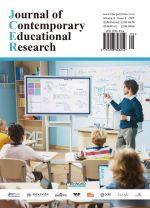Research on Pragmatic Relevance and Translation of Tea Culture Terminology from the Perspective of Digitalized Teaching
Abstract
This paper focuses on the teaching of tea culture terminology translation against the backdrop of digital transformation in education. Based on the theory of pragmatic relevance, the research emphasizes shifting the focus of translation from static linguistic equivalence to more dynamic communicative effectiveness. This paper advocates the flexible application of various strategies. These include literal translation, free translation, transliteration with annotation, and adaptive translation based on the target audience’s cognitive context. The paper innovatively proposes digitally-enabled teaching implementation paths, including constructing modular online courses, building intelligent terminology case databases, conducting cloud-based workshops on translation, and implementing industry-academia collaborative project practices. These aim to reshape the teaching process utilizing digital technology, effectively cultivating higher vocational students’ cultural communication abilities and practical translation skills, thereby providing high-quality language service talent support for the internationalization of Chinese tea culture.
References
Xie S, Zou Q, 2025, English Translation Strategies for “Liubao Tea” and the Dissemination of Its Cultural Connotations. Fujian Tea Journal, 47(8): 143–145.
Fang X, 2025, Translation of Tea Culture Loaded Words under the Guidance of Skopos Theory Fujian Tea Journal, 47(8):149–151.
Sperber D, Wilson D, 1995, Relevance: Communication and Cognition. Oxford: Blackwell.
Wilson D, 2003, Relevance Theory and Lexical Pragmatics. Italian Journal of Linguistics, 15: 273–291.
Li Z, 2023, The Development of Pragmatic Translation Studies in China and Abroad (2011–2020). Shanghai Journal of Translators, 2023(2): 8–13.
Ma G, 2022, The Application of Pragmatics Theory in English-Chinese Translation. Journal of Heihe University, 13(6): 101–103.
Zheng Y, 2017, An Exploration of the English Translation of Tea Names in Chinese Tea Culture. Fujian Tea Journal, 39(6): 223–224.
Wang Y, Xu S, 2023, A Study on the Theory of Emotion-Circumstance Correlation in Non-Literal Expression: Pragmatic Paradigm and Semantic Realization. Foreign Language Learning Theory and Practice, 2023(2): 31–38 + 98.
Yao K, Tang L, 2022, Visual Analysis of the Development Trend of Pragmatic Translation Studies (1986–2020) in China. Technology and Innovation Management, 43(3): 351–358.
Lu G, Lin Y, 2023, A Study on the Construction of a Chinese-English Terminology Database of Ancient Chinese Tea Culture: Problems and Countermeasures. Cultural Industry Journal, 2023(4): 65–67.
Li L, Kong X, 2019, On the Translation Issues of Tea Culture Terminology. Drama Home Journal, 2019(32): 234.
Li Z, Li X, Wang S, 2024, Exploration and Practice of Digital Empowerment of Modular Teaching Model in Higher Vocational Education. China New Telecommunications Journal, 26(23): 122–124.
Wang M, 2023, Analysis of Teaching Cases of Vocational Education Curriculum with Multiple Intelligences. Electronic Technology, 52(7): 366–367.
Xie D, 2025, Teaching Model Construction of Translation Workshop from the Perspective of Eco-Translatology. Financial Theory and Teaching, 43(3): 100–104.
Zhang L, 2021, An Analysis of the School-Enterprise Cooperative Teaching Mode of Business English Major Based on Synergy Theory. Journal of Hubei Open Vocational College, 34(15): 171–172.

